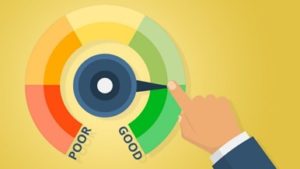May 1, 2019 – By Tobie Stanger

But according to a recent survey of approximately 1,500 consumers by U.S. News & World Report, many Americans are underinformed about their credit scores—and especially about how to improve them.
Less than half the survey respondents knew, for example, that consistently making payments on time has a major positive impact on your score. A full 49 percent weren’t sure whether you need to carry a credit card balance to boost your score (you do not).
And close to a quarter of the people surveyed believed that people with higher incomes automatically score higher than those who didn’t make as much money. In actuality, income isn’t considered in determining credit scores. It’s all about how you manage the money you do have.
The brand of credit score used in more than 90 percent of consumer-credit decisions, the FICO score, typically ranges from a low of 350 to a high of 850; good scores begin in the mid-to-high 600s.
If your score is lower than you’d like, it’s worthwhile to learn how to improve it. Just bear in mind that, depending on the reason for the poor score, it could take from 12 to 24 months to improve, says Bruce W. McClary, vice president of communications at the National Foundation for Credit Counseling, a group that represents nonprofit credit counseling agencies.
You can speed up the process by enrolling in a debt-management program and consistently maintaining on-time payments, “but there’s no instant fix,” he says.
Steps to Improve Your Credit Score
- Pay your credit card and other bills on time.
Thirty-five percent of the FICO score is determined by your payment history—that is, how often you pay on time. It’s better to pay the minimum each month than fall behind.
- Check your credit reports.
Request one free credit report from a different reporting agency every four months through AnnualCreditReport.com. “Hard pull” credit inquiries—from a potential lender and others with permission from you—can lower your scores slightly, but there’s no penalty for checking yourself. - Don’t apply for multiple credit cards at once.
Unlike applying for a mortgage, an auto loan, or a student loan, applying for several credit cards generates multiple hard pulls about your credit history and can hurt your score. - Don’t open too many new credit accounts at once.
By doing so, you reduce the average “age” of your accounts, which can lower your credit score. - Don’t cancel unused cards (unless they carry an annual fee).
Part of your score depends on the ratio of credit used to total available credit. Eliminating a card reduces your credit line and can raise the ratio, which works against you. - Keep credit balances low.
Maintaining a revolving credit balance under 10 percent of your total available credit is wise. A higher ratio indicates an elevated credit risk. “If you use your entire limit or close to it, your ratio will reflect negatively, which in turn will negatively affect your credit score,” says Katie Ross, education and development manager for American Consumer Credit Counseling, a nonprofit that offers guidance to consumers and is based in Boston. - Maintain a variety of credit types.
Successfully paying, say, an auto loan, a student loan, and credit card bills over the same period shows that you’re able to juggle different types of credit. That accounts for 10 percent of your score. - Pay off debt in collection.
Most current versions of the FICO score ignore collections with a zero balance. - Beware of keeping high balances.
If you charge everything on your rewards card for the points, for instance, switch to cash or a debit card for a couple of months before applying for new credit. Lenders can’t tell from your score whether you pay your balances in full every month. But they’ll see from your credit score, a snapshot in time, that you’re charging a lot relative to your credit limit. That can be viewed negatively. - Get a personal loan to pay off credit card debt.
You can improve your credit score by paying off your credit card debt by taking out a personal loan. The interest rate on the loan is also likely to be lower than credit card interest rates. - Get a secured credit card after bankruptcy.
If you’ve been through bankruptcy, start populating your credit report with good credit. Using a secured credit card (that’s linked to a bank savings account) may be an effective way to rebuild your credit. A bankruptcy will have less impact on your score over time as long as you aren’t defaulting on new loans. Keep in mind, though, that Chapter 7 and 13 bankruptcies stay on your credit report for up to 10 years. - Consider getting a little help from alternative data.
Consumers with less than stellar scores may now be able to get lenders to take into account other indicators of fiscal responsibility, like regular utility or mortgage payments. Experian Boost allows consumers to give read-only access of their bank account data to Experian to show their payment histories. The service takes into account only positive information and can be turned off at the consumer’s discretion. (A similar new service, UltraFICO, focuses on how well the consumer manages money, looking at things like keeping a balance in savings and avoiding bounced checks.) The leg up is not likely to be large, but it can potentially help many consumers’ credit scores.
